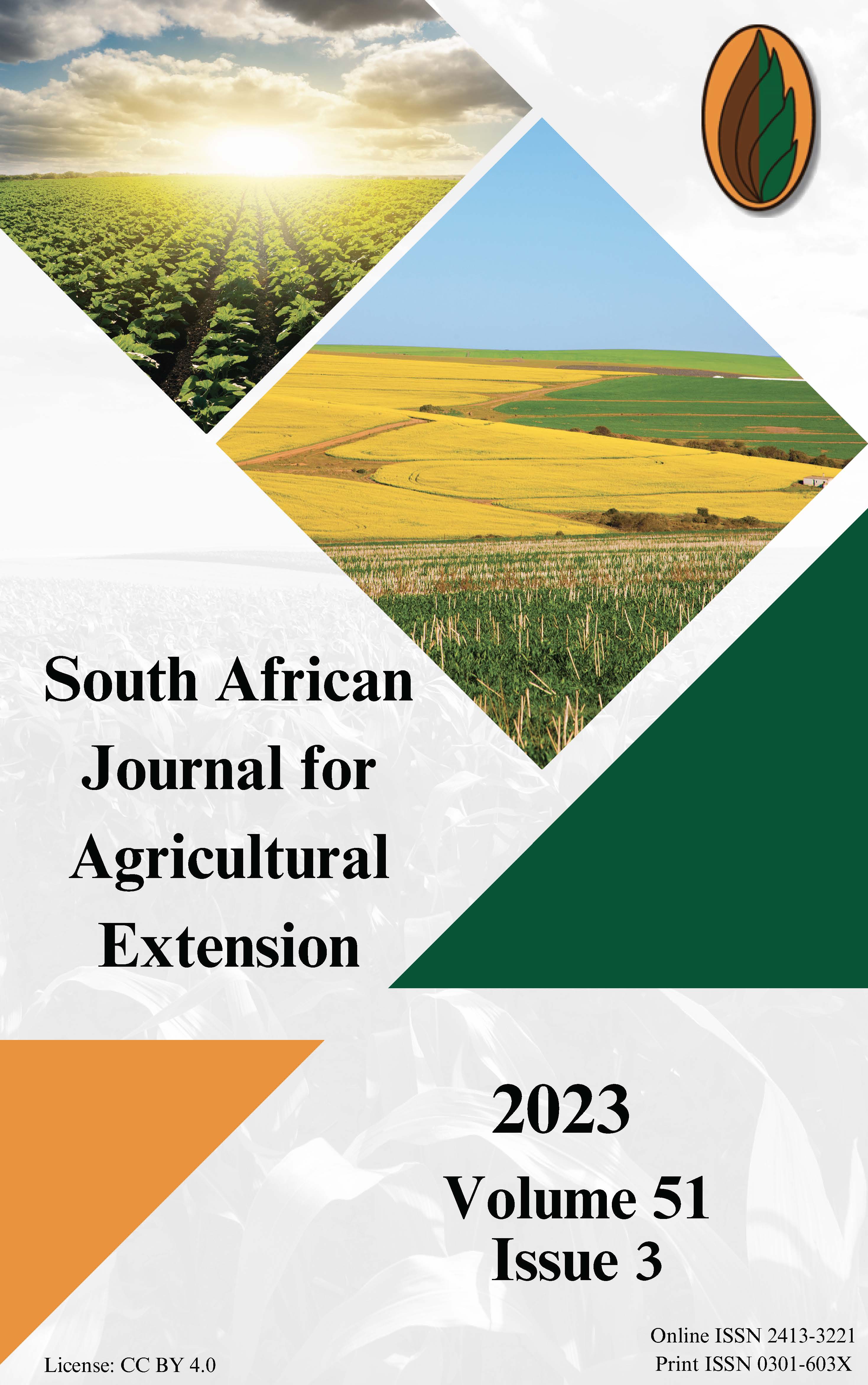Assessing Awareness and Perceptions Towards the Existence of Indigenous Foods in Port St Johns of the Eastern Cape South Africa
DOI:
https://doi.org/10.17159/2413-3221/2023/v51n3a13952Keywords:
Consumption of Indigenous Fruits and Vegetables, Food security, Indigenous fruits and vegetables, Rural householdsAbstract
Intolerably high rates of food insecurity and micronutrient deficiencies still prevail at an alarming rate in rural poor communities who practice subsistence farming. Despite the fact that, the indigenous fruits and vegetables are abundantly available and are easily accessible in these rural communities. The consumption of indigenous vegetables and fruits can combat the food insecurity and micro-nutrient deficiencies in the resource-constrained communities. This is attributed to negative perceptions shared among rural communities specifically the younger generation are unaware about the indigenous foods. Against this background, the study was developed to assess awareness and perceptions towards indigenous fruits and vegetables in Port St Johns of the Eastern Cape Province of South Africa.
Intolerably high rates of food insecurity and micronutrient deficiencies still prevail at an alarming rate in rural poor communities that practice subsistence farming. Even though indigenous fruits and vegetables are abundantly available and are easily accessible in these rural communities. The consumption of indigenous vegetables and fruits can combat food insecurity and micro-nutrient deficiencies in resource-constrained communities. This is attributed to negative perceptions shared among rural communities, specifically the younger generation, who are unaware of indigenous foods. Against this background, the study was developed to assess awareness and perceptions towards indigenous fruits and vegetables in Port St. Johns of the Eastern Cape Province of South Africa. A multi-stage sampling technique was used to evaluate the availability of the perceptions of households and the contribution of indigenous fruits and vegetables to household food security. A total of 340 respondents were purposively selected in the study area. A positive impact on household food security was revealed, suggesting that consuming indigenous fruits and vegetables may address rural household dietary diversity and food insecurity. The study argues that indigenous fruits and vegetables may be used as a food security coping strategy at the household level in rural areas, given their availability, especially in summer. Additionally, dispelling several negative perceptions and targeting consumption drivers will enhance the food security nexus of indigenous fruits and vegetables at the household level.
Downloads
References
ABUKUTSA-ONYANGO, M.O., ADIPALA, E., TUSIIME, G. & MAJALIWA, J.G.M., 2010. Strategic repositioning of African indigenous vegetables in the Horticulture Sector. Paper presented at Second RUFORUM Biennial Regional Conference on “Building capacity for food security in Africa”, 20 -24 September, Entebbe, Uganda, 1413-1419.
ADEBOOYE, O.C. & OPADODE, J.T., 2004. Status of conservation of the indigenous leaf vegetables and fruits of Africa. Afr. J. Biotechnol., 3(12): 700 - 705.
CLOETE, P.C. & IDSARDI, E., 2012. Bio-fuels and food security in South Africa: The role of indigenous and traditional food crops. Paper presented at International Association of Agricultural Economists Conference, 18 – 24 August, Foz do Iguacu, Brazil, 1 – 30.
FABER, M., OELOFSE, A., VAN JAARSVELD, P.J., WENHOLD, F.A. & JANSEN VAN RENSBURG, W.J., 2010. African leafy vegetables consumed by households in the Limpopo and KwaZulu-Natal provinces in South Africa. South Afr J Clin Nutr., 23(1): 30 - 38. DOI: https://doi.org/10.1080/16070658.2010.11734255
LEWU, F.B. & MAVENGAHAMA, S., 2010. Wild vegetables in Northern KwaZulu Natal, South Africa: Current status of production and research needs. Sci. Res. Essay., 5(20): 3044 - 3048.
DEMI, S.M., 2014. African indigenous food crops: Their roles in combatting chronic diseases in Ghana. Unpublished doctoral dissertation, University of Toronto, Canada.
DWEBA, T.P. & MEARNS, M.A., 2011. Conserving indigenous knowledge as the key to the current and future use of traditional vegetables. Int. J. Inf. Manag., 31(6): 564 - 571. DOI: https://doi.org/10.1016/j.ijinfomgt.2011.02.009
ELAGO, S.N. & TJAVEONDJA, L.T., 2015. Socio-Economic Importance of two Indigenous Fruit Trees: Strychnos Cocculoides and Schinziophyton Rautanenii to the people of Rundu Rural West Constituency in Namibia. EJPAS., 3(2): 16 - 26.
EKESA, B.N., WALINGO, M.K. & ONYANGO, M.O., 2009. Accessibility to and consumption of indigenous vegetables and fruits by rural households in Matungu division, western Kenya. AJFAND., 9(8): 1 - 14. DOI: https://doi.org/10.4314/ajfand.v9i8.48410
FLYMAN, M.V. & AFOLAYAN, A.J., 2006. The suitability of wild vegetables for alleviating human dietary deficiencies. S. Afr. J. Bot., 72(4): 492 - 497. DOI: https://doi.org/10.1016/j.sajb.2006.02.003
HAULE, M.J., 2016. Edible Indigenous fruits business, household income and Livelihoods of People of Songea District, Tanzania. Int J Agric Innov Res., 5(1): 2319 - 1473.
HUGHES, C., 2006. Quantitative and qualitative approaches. Warwick: University of Warwick.
JANSEN VAN RENSBURG, W.S., VENTER, S.L., NETSHILUVHI, T.R., VAN DEN HEEVER, E. & DE RONDE, J.A., 2004. Role of indigenous leafy vegetables in combating hunger and malnutrition. S. Afr. J. Bot., 70(1): 52-59. DOI: https://doi.org/10.1016/S0254-6299(15)30268-4
JIBA, P., 2017. Evaluation of the socio-economic performance of smallholder irrigation schemes in Idutywa village of the Eastern Cape Province.
KALABA, F.K., 2007. The role of indigenous fruit trees in the rural livelihoods: a case of the Mwekera area, Copperbelt province, Zambia. Unpublished doctoral dissertation, Stellenbosch: University of Stellenbosch, Western Cape, South Africa.
KEPE, T., 2008. Beyond the numbers: Understanding the value of vegetation to rural livelihoods in Africa. Geoforum., 39(2): 958 - 968. DOI: https://doi.org/10.1016/j.geoforum.2007.10.004
LEGWAILA, G.M., MOJEREMANE, W., MADISA, M.E., MMOLOTSI, R.M. & RAMPART, M., 2011. Potential of traditional food plants in rural household food security in Botswana. J. Hortic. For., 3(6): 171-177.
MAJOVA, V.J., 2014. The rural-urban linkage in the use of traditional foods by peri-urban households in Nompumelelo community in East London, Eastern Cape. IAJIKS., 13(1): 164 - 174.
MAROYI, A., 2011. Potential role of traditional vegetables in household food security: A case study from Zimbabwe. Afr. J. Agric. Res., 6(26): 5720-5728. DOI: https://doi.org/10.5897/AJAR11.335
MAVENGAHAMA, S., 2013. The role of indigenous vegetables to food and nutrition within selected sites in South Africa. Unpublished doctoral thesis, Stellenbosch University, Western Cape Province, South Africa.
MATENGE, S.T., VAN DER MERWE, D., KRUGER, A. & DE BEER, H., 2011. Utilisation of indigenous plant foods in the urban and rural communities. IAJIKS., 10(1): 17 - 37.
MITHÖFER, D., WAIBEL, H. & AKINNIFESI, F.K., 2006. The role of food from natural resources in reducing vulnerability to poverty: a case study from Zimbabwe. Paper presented at the 26th Conference of the International Association of Agricultural Economists (IAAE), 12 – 18 August, Gold Coast, Australia, 1 - 14.
MODI, M., MODI, A. & HENDRIKS, S., 2006. Potential role for wild vegetables in household food security: a preliminary case study in KwaZulu-Natal, South Africa. AJFAND., 6(1): 1 -13. DOI: https://doi.org/10.4314/ajfand.v6i1.19167
MPALA, C., DLAMINI, M. & SIBANDA, P., 2015. The accessibility, utilisation and role of indigenous traditional vegetables in household food security in rural Hwange District. International Open and Distance Learning Journal., 1(3): 34 -49.
NTULI, N.R., ZOBOLO, A.M., SIEBERT, S.J. & MADAKADZE, R.M., 2012. Traditional vegetables of northern KwaZulu-Natal, South Africa: Has indigenous knowledge expanded the menu?. Afr. J. Agric. Res., 7(45): 6027 - 6034. DOI: https://doi.org/10.5897/AJAR11.2195
OLADELE, O.I., 2011. Contribution of indigenous vegetables and fruits to poverty alleviation in Oyo State, Nigeria. J Hum Ecol., 34(1): 1 - 6. DOI: https://doi.org/10.1080/09709274.2011.11906362
OR TAMBO DISTRICT MUNICIPALITY., 2010. Integrated Development Plan Review 2010/2011. [Pamphlet]. Mthatha, South Africa.
PORT ST JOHNS LOCAL MUNICIPALITY., 2016. Integrated Development Plan Review 2016/2017. [Pamphlet]. Mthatha, South Africa.
SCHIPPERS, R.R., 2000. African indigenous vegetables: An overview of the cultivated species. Natural Resources Institute/ACP-EU Technical Center for Agricultural and Rural Cooperation, Chatham, UK.
SCHRECKENBERG, K., AWONO, A., DEGRANDE, A., MBOSSO, C., NDOYE, O. & TCHOUNDJEU, Z., 2006. Domesticating indigenous fruit trees as a contribution to poverty reduction. For. Trees Livelihoods., 16(1): 35 - 51. DOI: https://doi.org/10.1080/14728028.2006.9752544
SHACKLETON, C.M., 2003. The prevalence of use and value of wild edible herbs in South Africa. S. Afr. J. Sci., 99(1): 23 – 25.
SMITH, I.F. & EYZAGUIRRE, P., 2007. African leafy vegetables: Their role in the WHO’s global fruit and vegetable initiative. AJFAND., 7(3): 1-17. DOI: https://doi.org/10.18697/ajfand.14.IPGRI1-1
TALENI, V. & GODUKA, N., 2013. Perceptions and use of indigenous leafy vegetables (ILVs) for nutritional value: A Case study in Mantusini Community, Eastern Cape Province, South Africa. Paper presented at the Proceedings of the International Conference on Food and Agricultural Sciences,1 -12 October, Melakaelaka, Malaysia, 1 - 14.
VAN JAARSVELD, P., FABER, M., VAN HEERDEN, I., WENHOLD, F., VAN RENSBURG, W.J. &VAN AVERBEKE, W., 2014. Nutrient content of eight African leafy vegetables and their potential contribution to dietary reference intakes. J. Food Compos. Anal., 33(1): 77 - 84. DOI: https://doi.org/10.1016/j.jfca.2013.11.003
VORSTER, H.J., VAN RENSBURG, W.S.J., STEVENS, J.B. & STEYN, G.J., 2008. The role of traditional leafy vegetables in the food security of rural households in South Africa. Paper presented at the International Symposium on Underutilized Plants for Food Security, Nutrition, Income and Sustainable Development 806, 3 -7 March, Arusha, Tanzania, 23 - 28. DOI: https://doi.org/10.17660/ActaHortic.2009.806.27
VAN DER HOEVEN, M., OSEI, J., GREEFF, M., KRUGER, A., FABER, M. & SMUTS, C.M., 2013. Indigenous and traditional plants: South African parents’ knowledge, perceptions and uses and their children’s sensory acceptance. J. Ethnobiol. Ethnomedicine., 9(1): 61 - 78. DOI: https://doi.org/10.1186/1746-4269-9-78
WEMALI, E.N.C., 2014. Contribution of cultivated African Indigenous Vegetables to agro-biodiversity conservation and community livelihood in Mumias Sugar Belt, Kenya. Unpublished doctoral dissertation, Kenyatta University, Nairobi County, Kenya.
Downloads
Published
Issue
Section
License
Copyright (c) 2023 S.S. Ntlanga, P. Jiba, M. Christian, L. Mdoda

This work is licensed under a Creative Commons Attribution 4.0 International License.








.png)